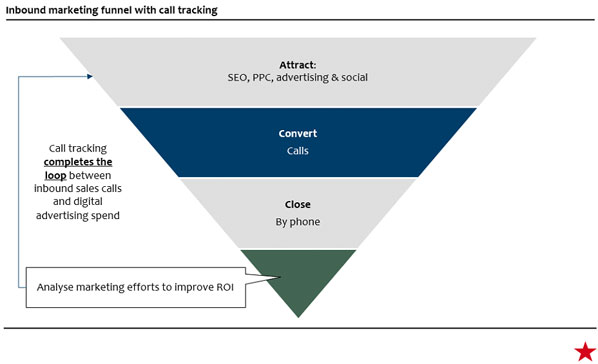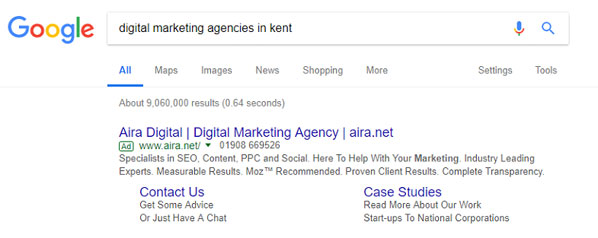
Now we’re living in a digital age, the competition for digital agencies has heated up. More and more businesses are allocating budget to dominate the online market, so how exactly can you determine how your campaigns are performing and ensure your agency can prove its value to clients?
In a world full of resources for measuring success (analytics, channels, and tracking tools) many agencies struggle with determining whether they’re monitoring the most appropriate key performance indicators (KPIs) to calculate their clients’ return on investment (ROI).
Thankfully, the answer can be found in the form of call tracking. But simply investing in this handy tool isn’t enough; you need to know which metrics to monitor to get your clients the best results, thus boosting their investment into your agency.
Here are five crucial phone calls metrics your digital agency should be tracking:
Source of Call
With competition fierce for digital agencies, it’s unsurprising they are advertising across multiple channels. Whether it’s through pay-per-click (PPC) campaigns, emails newsletters, social media, your business needs to know which marketing methods are driving phone calls. Otherwise, how can you measure your campaign performance and determine whether spend needs to be reallocated? This is where call tracking comes in.

Call tracking, from companies such as Mediahawk, completes the loop between advertising spend and sales. Through visitor level call tracking, you can allocate individual, dynamic numbers to marketing campaigns to pinpoint which ads or channels are generating phone call conversions for your business. The data collected will provide a detailed report on the ROI for each marketing channel.

For example, let’s say a business wanted to locate a digital marketing agency in their local area and searched “digital marketing agencies in Kent”.
Unfortunately, as the agency have listed a phone number in their PPC ad, the user was able to phone their business without needing to click the ad; meaning they wouldn’t be able to attribute which online marketing method generated the offline conversion. This could cause them to assume the AdWords campaigns aren’t generating sufficient ROI.
Alternatively, if the agency integrated call tracking to AdWords, every user who visited their website from their PPC campaigns would be assigned a unique, tracked phone number. This works by replacing the previous HTML phone number. Then, the JavaScript code on their website will capture the keyword that triggers the ad.
This data can then be used to tie phone calls to the agency’s PPC campaigns, giving them a complete overview of their performance and the opportunity to make smarter, data-backed decisions on their future AdWords campaigns.
Call Duration
It’s generally assumed longer calls equate to better leads – if your agency receives a lot of calls, you’ll need to pinpoint which marketing method these high-quality calls originated from.
Using call tracking, your agency can track which ads, campaigns, landing pages and keywords generated the most profitable (the longest) phone calls. As we live in a world full of spam callers, not all will count has legitimate leads – e.g. telemarketers trying to sell you their services. There is one way to combat this is by setting a call-length, which will stop spam calls counting as a lead. The length will ultimately depend on your agencies’ operation and the service(s) a potential client is enquiring about.
Calls Before a Conversion
It’s not always a guarantee that a potential client will decide to do business with your agency after the first phone call. On average, it takes 18 calls to fully connect with a potential buyer.
Therefore, it’s essential you know on average how many calls it takes before a conversion is made to help refine your agencies’ sales funnel and create a customer journey map.
Call recording and quality scoring is essential for improving your agencies’ customer journey. It gives you access to stacks of data on real-life calls, which you can playback and monitor for performance. This data will provide you with valuable insights on the quality of communication offered to both existing and potential customers to revolutionise your output of sales. Furthermore, your business will be able to calculate how long it took for a lead to turn into a sale.
Previous Interactions
When a potential customer calls again, knowing their previous interactions with your agency is crucial for keeping the relationship going.
Through call tracking, you can generate live customer insights that can be plugged into your customer relation management (CRM) systems. This way, you’ll be able to view specific information on the customer they’re speaking with, including the keywords they used to find you, the first page they visited on your website and whether they’ve called before.
The real-time customer intelligence will provide your team with relevant information to tailor a conversation to that specific customer.
Landing Page Performance
Nearly all landing pages on a website provide a visitor with a form fill and phone number to get in touch. However, without call tracking, the majority of PPC advertises can only attribute success back to form completions; creating an inaccurate conversion rate.
Introducing call tracking will reveal data which landing pages are generating the most high-quality phone call conversions, meaning you gain a full picture of your landing pages’ performance. As you’re a digital agency, it’s likely you’ll be suggesting landing page optimisation to new, potential and existing clients, so you certainly need to practice what you preach.
Landing page analysis should be approached from several angles. Be sure to ask yourself the following questions on which landing pages:
- Drive the most calls
- Generate the most customers and best conversion rate (conversions/calls = call conversion rate)
- Produce the highest quality leads
This will aid you in measuring your ROI and determining which landing pages require optimisation, allowing you to better your website’s overall performance and appearance as a high quality digital agency.
About the Author
Natalia Selby is Marketing coordinator at Mediahawk, with over 10 years experience in analytics, content management and eCommerce.




